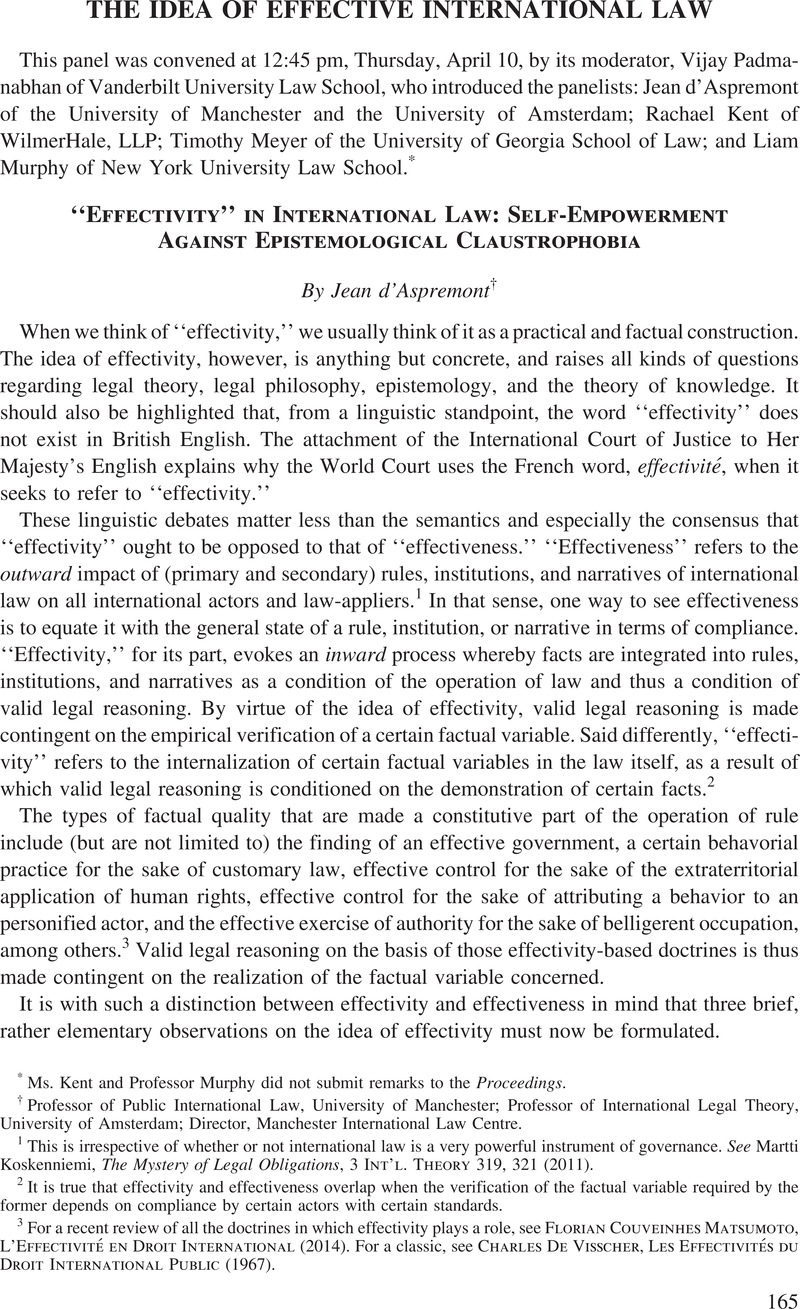Article contents
“Effectivity” in International Law: Self-Empowerment Against Epistemological Claustrophobia
Published online by Cambridge University Press: 20 January 2017
Abstract

- Type
- The Idea of Effective International Law
- Information
- Copyright
- Copyright © American Society of International Law 2015
References
* Ms. Kent and Professor Murphy did not submit remarks to the Proceedings.
1 This is irrespective of whether or not international law is a very powerful instrument of governance. See Koskenniemi, Martti, The Mystery of Legal Obligations, 3 Int’l. Theory 319, 321 (2011)CrossRefGoogle Scholar.
2 It is true that effectivity and effectiveness overlap when the verification of the factual variable required by the former depends on compliance by certain actors with certain standards.
3 For a recent review of all the doctrines in which effectivity plays a role, see Florian Couveinhes Matsumoto, L’effectiviteé En Droit International (2014). For a classic, see Charles De Visscher, Les EffectiviteéS du Droit International Public (1967).
4 On the relationship between international law, ideas, and the power of ideas, see Allott, Philip, The True Function of Law in the International Community, 5 Global L. Stud. J. 391 (1998)Google Scholar. See also Allott, Philip, The Concept of International Law, 10 Eur. J. Int’l L. 31 (1999)CrossRefGoogle Scholar.
5 Crawford, James, International Law as Discipline and Profession, 106 ASIL Proc. 471, 486 (2012)Google Scholar (“We are collectively part of the makers of that world”).
6 Simpson, Gerry, On the Magic Mountain: Teaching Public International Law, 10 Eur. J. Int’l L. 70, 74 (1999)CrossRefGoogle Scholar (“We are often delighted when judges take notice of international law”).
7 For critical remarks on the pitfall of self-referentiality, see Jean d’Aspremont, International Lawyers Live!, available at http://ssrn.com/abstract=2271115 (introductory speech to the Fifth Research Forum of the European Society of International Law).
8 This does not mean that they lack awareness of the risk of failure, and includes what Martti Koskenniemi calls a “commitment,” that is, a sentimental attachment to the field’s constitutive rhetoric and traditions with some awareness of the risk of failure. See Koskenniemi, Martti, Between Commitment and Cynicism: Outline of a Theory of International Law as Practice, in Collection of Essays by Legal Advisors 493 (1999)Google Scholar.
9 This finding is irrespective of the fact that international lawyers do not need international law as a warrant for their existence as a professional discipline. See Crawford, supra note 5 (“One does not have to believe in the existence of God to credit the existence of the clergy”). See also d’Aspremont, supra note 7.
10 As is well-known, this is an image that has been the object of compelling contestations over the last decades. See, e.g., Martti Koskenniemi, The Gentle Civilizer of Nations (2004).
11 See generally Singh, Sahib, International Law as a Technical Discipline: Critical Perspectives on the Narrative Structure of a Theory, in Jean d’Aspremont, Formalism and the Sources of International Law 236 (2013).Google Scholar
- 1
- Cited by




